Letter from the Editor
At Lethal Minds Journal, we want to be “The Voice of the Barracks.” More accurately, we want to host your voice, from the barracks, in that effort. As part of that, I write to you each month, generally in a way that would not offend my mother’s sensibilities or create questions I don’t want to answer from my child. But the truth is, the barracks don’t always speak that way. Sometimes, the voice of the barracks is a squad leader unambiguously offering some much-needed truth to a wayward soldier. Sometimes, it’s a company Gunnery Sergeant explaining very directly how it’s going to be to Marines. So it goes from time to time here at Lethal Minds Journal. So, bring it in, form a school circle, and listen up when I say, “Stop propagating ideas that are patently untrue, a distortion of reality, or just really fucking dumb. You’re hurting the country.” We are in a time of information overload, a time when people somehow simultaneously have more means to rapidly verify the truth of the information presented to them and increasingly decide not to. Maybe the world is more comfortable when we exist unchallenged in our siloes of reality. Maybe freedom is scary. It should be. It’s not easy to be a citizen in a nation with a still revolutionary form of government, one that tries to balance rights and responsibilities, obligations and opportunities against a changing landscape composed of 321 million disparate opinions. Relative to those opinions, I ascribe to the idea attributed to Voltaire, “I disapprove of what you say, but I will defend to the death your right to say it.” But while it is wholly reasonable and deeply American to criticize a political representative, oppose or support legislation, and demand change or redress for issues that affect our lives, choosing to believe and spread facially stupid things plays directly into the hands of the “enemies foreign and domestic” dividing us amongst ourselves. E pluribus unum, motherfucker. F. Scott Fitzgerald asserted, “The test of a first-rate intelligence is the ability to hold two opposed ideas in the mind at the same time, and still retain the ability to function." I have a method I use to try to pass that test. I question myself first as a means of avoiding the traps laid by bot farms and cyber operators trying to convince me I am stronger with them than standing together with my fellow Americans, even the ones with whom I disagree vociferously. If for no other reason than affirming my autonomy as a citizen, I don’t accept without criticism or question opinions that trigger happy dopamine transmissions just because they come from my side of an issue. I try not to immediately discount opinions that give me that increasingly American sense of righteous outrage because they come from the other side. I seek to poke holes in my own logic as aggressively as I do that of Americans who think differently. It is often uncomfortable. I wish I had the certainty of people who ‘do their own research’ and recommend YouTube videos from a guy who puts aluminum foil over his windows. But speaking from a place of high suspicion and low information is not a good look when you have virtually all of the information in the world available in the 6 x 4 electronic rectangle you are probably staring at right now. You just have to be a critical consumer because everything is a conspiracy when you don't know how anything works. The world is a grey place. Things work out well and poorly. Results are fair and unjust. Performances are flawless and incompetent. That’s how it is with human beings, who have been at the essence of every concerted effort to accomplish every goal in history. It has always been flawed humans, for good and ill, who have made things happen. Or not. Demand the most from them, from us. But with that demand comes an obligation to contribute as much as you take. One way you can do so is by sharing your thoughts here. We want your opinions, professional lessons learned, thoughts, and art. All you have to be is a veteran or current service member. We will even consider “friends thereof” on a case by case basis if we think it accrues to the benefit of service members. Fire for Effect, Russell Worth Parker Editor in Chief - Lethal Minds Journal Submissions are open at lethalmindsjournal.submissions@gmail.com.
Dedicated to those who serve, those who have served, and those who paid the final price for their country.
Lethal Minds is a military veteran and service member magazine, dedicated to publishing work from the military and veteran communities.
Two Grunts Inc. is proud to sponsor Lethal Minds Journal and all of their publications and endeavors. Like our name says we share a similar background to the people behind the Lethal Minds Journal, and to the many, many contributors. Just as possessing the requisite knowledge is crucial for success, equipping oneself with the appropriate tools is equally imperative. At Two Grunts Inc., we are committed to providing the necessary tools to excel in any situation that may arise. Our motto, “Purpose-Built Work Guns. Rifles made to last,” reflects our dedication to quality and longevity. With meticulous attention to manufacturing and stringent quality control measures, we ensure that each part upholds our standards from inception to the final rifle assembly. Whether you seek something for occasional training or professional deployment, our rifles cater to individuals serious about their equipment. We’re committed to supporting The Lethal Minds Journal and its readers, so if you’re interested in purchasing one of our products let us know you’re a LMJ reader and we’ll get you squared away. Stay informed. Stay deadly. -Matt Patruno USMC, 0311 (OIF) twogruntsinc.com support@twogruntsinc.com
In This Issue
The World Today
Commentary on the recruitment of cyber operators
Opinion
What So Many People Don't Understand
The Written Word
Scout Swimmer
The Distance
Poetry and Art
The Lonely Company
Glimpses Of
Book Review
Training for Victory by Frank Sobchak
The World Today
Fiction and Nonfiction written by servicemen and veterans.
Commentary on the recruitment of cyber operators in Switzerland
Jonas Frey
On a recent episode of the Irregular Warfare Podcast regarding cyber forces and particularly the recruitment of cyber operators, Lieutenant Colonel (retired) Kurt Sanger said, "How are we going to win on game day? That depends on who is going to be there on game day, and of course, in cyberspace, every day is game day." While the Swiss conscript army can under no circumstances be compared to the US Armed Forces, one could argue that the establishment of the Swiss Cyber Battalion in recent years shows how recruitment can play out.
Switzerland has a long tradition of educating youngsters with apprenticeships after nine years of mandatory schooling. Roughly 60 percent of Swiss youth choose an apprenticeship over high school. An apprenticeship is highly regulated and takes anywhere from two to four years to accomplish. Apprentices finish their education with rigorous exams preceding graduation. The diploma allows them to apply to any job that requires this exact profile. As an example, the chairman of the board of directors of UBS Bank in the early 2000s, Marcel Ospel, started his career with an apprenticeship and became arguably one of the most powerful men in Switzerland without any university degree. This also means that Switzerland has a pool of very well-trained IT specialists who learn their trade early on, in the course of an apprenticeship.
Secondly, since the Swiss Constitution foresees mandatory conscription for all males (females can already join the armed forces on a voluntary basis, and general conscription is being discussed in parliament), every young man has to go through the recruitment process. When one is physically and mentally apt for service, they are ordered to attend basic training.
This recruitment process screens many different profiles for various occupations within the armed forces. Thus, allowing young men from all walks of life to serve their country, to include IT specialists who normally get placed in the command support branch for their basic training. This ensures two things: that the armed forces can profit from the civilian education of their conscripts and that a large pool of potential is forced through the system, creating an output of roughly 20,000 conscripts every year.
Thirdly, the main recruitment process to become a cyber operator starts during this basic training phase. This means that conscripts are already immersed in the military; they volunteer to become cyber operators, and they have to pass multiple stages of selection.
In addition to all of this, at the end of their conscript service, cyber operators may get certified, which integrates into the diploma system mentioned earlier and allows them to find advanced jobs following their conscription in the service.
Even though the conscript system is highly inefficient and ineffective in comparison to a professional army, the Swiss Armed Forces have found a way to capitalize on the civilian cyber education system. In doing so, they recruit and employ skilled cyber operators during conscript service and return those cyber operators to the civilian world with added certifications and skills.
Opinion
Op-Eds and general thought pieces meant to spark conversation and introspection.
What So Many People Don’t Understand
Heather O’Brien
What so many people don’t understand is while they moved on, we were stuck every day remembering: two towers falling; the core of our military smoking and in ruins; a gash of land in Pennsylvania; the last words of Todd Beamer, which actually became a unit’s motto, “Let’s Roll.”
I left my homeland to right those wrongs and in return it felt like she left me over there and moved onto other things.
While many of us were off in foreign lands, our home became foreign to us. When I came home, I saw my childhood heroes being shot, mocked, and told they were useless. If my country could treat our domestic first responders this way, how would they treat me and my friends, the nation’s first overseas responders?
Veteran homelessness blossomed overnight. At times I lived in my car; a safe haven from the “normal” people I could no longer understand. My alcohol and drug use grew just like so many others, followed by shameful arrests.
I had my answer. The public now thought we, yesterday’s heroes, were today’s monsters.
So I isolated. I cut myself off from my family, going almost six years with minimal contact.
Even as I managed to keep a good job, I refused to let people see the chaos growing in my mind. I told no one my experiences but kept them safe inside even as they ate away at my soul. I slept less and less, trying to keep the nightmares away; but then they simply began to torment my waking world. The only “safe” people were my few buddies; everyone else was suspect, especially my family.
Suicide rates doubled, then tripled; my own attempt just one of a rising tide. The VA hospitals swelled and spilled broken people, me included, back into the streets, waiting for appointments, waiting to die. A long stay at the VA psych ward gave me a little stability - or at least the plethora of pills they pumped into me did. When I left, they told me to come back when I got suicidal again. Only one nurse stopped me and said, “Don’t make this place a habit.”
But I’m considered one of the lucky ones. It’s a bitter pill to swallow. I’m alive, but several of my friends aren’t. I know more people killed by the war of their mind than those in combat. The list only grows with every passing year. There were many times when I wished I had died over there rather than come home. At least over there I wouldn’t have to face the monster I now saw in the mirror.
But now my war is done. Right or wrong, my service will be forever synonymous with the wars we didn’t finish. But they did end, as brutally and violently as they started. Nineteen strange men who never knew I existed changed the course of my life. In a perverse way, I took their hate and turned it back on their whole race.
Now I must learn to stop hating, though I’ve hated for so long. I don’t know what it’s like not to be a monster. Friends and family always say, “You can tell me anything, I’ll listen.” But how do I know they mean it? Whenever I start to talk about the riots and violence, they look horrified. And I’m just trying to tell them a funny story. But they haven’t turned away or cut me out. Maybe they are stronger than I think.
I lived with the idea of being a monster for so long, I’ve forgotten how to be a person. But my friends and family know; they remember me from before the war and understand that while I’m different, I’m still human.
Yesterday, I played army with my little nephew. He is fascinated with all things military, especially since his class is learning about Veterans Day this year. As he chats about the day, I try and listen without wincing. Somehow hearing his happy sing-song voice say words like soldier, military, and war almost causes me physical pain. “Aunt Heather, I’m really glad you and Papa didn’t die in the war.” His simple statement made time stop. Suddenly, I’m glad I didn’t die, too.
One day, we will have a much longer conversation about war - one where the world isn’t always nice, in which violent men will cause pain and loss, and where ordinary people turn into monsters to kill the violent ones. When that day comes, I will tell him about the good, bad, traumatic, and hilarious parts of combat zones. I will speak the truth to him, but not yet.
Today with his hand placed in mine, I realized my war is over.
I’ve come home.
The Written Word
Fiction and Nonfiction written by servicemen and veterans.
Scout Swimmer
James Kretchman
“A moment of pain is worth a lifetime of glory.” – Louis Zamperini
It’s 2337. You’re treading water just outside the surf zone seventy-five meters from shore. Salt water stings your eyes and the gashes behind your knees where the wetsuit has rubbed your skin raw. The assistant chief and team corpsman bob beside you, noses just above the surface so they scan the shoreline. You turn back towards the surf and struggle to catch a glimpse of any of your security teams between each plunging wave. By now, they’re probably close to the shoreline, struggling to remove fins while ducking underneath each wave as it spills towards the beach. You hope they maintain a low profile in the water. The moon is eerily bright tonight, reflecting its light across the ocean in a sparkling splendor that would’ve been beautiful if it hadn’t been for the fact that it causes anything disturbing the surface to stand out like a chocolate chip in vanilla ice cream.
You turn your attention back to your main concern: the two enemy sentries walking their routes approximately forty meters away from the shoreline. They appear disinterested, wandering through knee and waist-high vegetated mounds that butt up to the sand of the beach. You see movement on the left edge of the shoreline. Two dark figures emerge from the water, speed-walk to the edge of the trash line, and throw themselves down into the vegetation left by receding waves. Left flank security team has splashed, you think to yourself. They took advantage of the sentry’s back being turned; that’s good. Hope the other teams do the same. Twenty-four seconds later, you see center wash up, and in another two minutes you see the right flank team sprint from the trash line to the edge of the beach and the veg line. They must’ve splashed without you spotting them. No change in the sentry patterns, all good for far. The minutes drag by as you watch the enemy sentries walking to and fro. Suddenly the sand explodes five feet away from the left sentinel as a dark silhouette collides with him, dragging them both back to the ground. Left sentry down, no outcry. Six minutes later the a-chief whispers, “Right sentry down.” You adjust your buoyant pack over your outstretched arm and underneath your head. The a-chief and corpsman each grab hold of the sides of your pack, creating the formation to swim into the surf. Here we go, you think to yourself as you begin to fin towards the surf. Time to get to work.
You’re a student at Scout Swimmer Course, one of the specialized schools in the Expeditionary Warfare Training Group (EWTG) pipeline for Marine Corps infantry boat companies. Your mission is to conduct reconnaissance of the beach landing site, determine eligibility of the location, mark obstacles, eliminate local sentries, set up communication signals, and call in the raid force for landing.
The first week was brutal. The first few days were pool PTs, weeding out the weak: fin sprints, ring of fire, distance fins, and bottom sample after bottom sample. Once the starting class size of twenty-four was whittled down to eighteen, the learning, conditioning, and mission training began. PT was fraught with fin-run-fins, equipment fins (finning with rifles, combat gear, and packs weighing up to 55lbs), and a boat race with a ruck-fin-ruck or two. The classroom portion consisted of PowerPoints teaching how to conduct surf observations (surobs), how to brief the company commander concerning the scout swimmer portion of the mission, and various ocean life to avoid.
Now we are deeper into the course, practicing the principles learned earlier. How to fin in formation, how to deploy security teams at intervals to counteract oceanic currents, how to swim ashore without being spotted by enemy lookouts, and how to camouflage on the beach using sand and local vegetation. We practice conducting sentry take-downs, establishing security on the beach landing site (BLS), conducting surobs, setting up ranges (directional glowing lights directed towards the awaiting raid force positioned far offshore), and signaling each wave to approach once conditions are set.
“ENDEX!” The call originates from the chief instructor, walking towards you from the huddle of black sweatshirts and faded ballcaps sporting the yellow skull and stars of the EWTGC logo standing close to your position. You and the rest of the team wash off the sand that covers every inch of your bodies in the surf and return for debrief.
“Fifty-three minutes,” the instructor checks his watch as the group gathers for a debriefing. “Within standards, finally. Good time gaps between sentry take-downs. You were slow signaling the second wave ashore. Your security collapsed too close when preparing to re-enter the boats for extract. All-in all: trash. Getting better, but still trash.” The group chuckles as they break off to carry boats to their trailers, wash off the salt water and residual sand, and hit the showers to peel off wetsuits and talk over the events of the evening.
Despite the gruff words of the cadre, we knew that progress was made. We still had a lot to improve, but watching the team develop from what looked like newborn babes struggling to learn finning technique into being able to accomplish the mission within the time standards set by the schoolhouse was satisfying. There were many steep learning curves and mistakes made initially: incorrectly constructed signals, packs losing buoyancy and sinking below the waterline, last-minute problems arising, leaving students scrambling to find last-second solutions. All that is behind us now; not much longer now until we graduate and receive the coveted black hoodie with the bold yellow words “AMPHIBIOUS RAIDS SCOUT SWIMMER” emblazoned on the back that less than thirty-six Marines each year earn the right to wear.
You turn back to catch another glimpse of the moonlight shimmering across the ocean.
Best job I ever had.
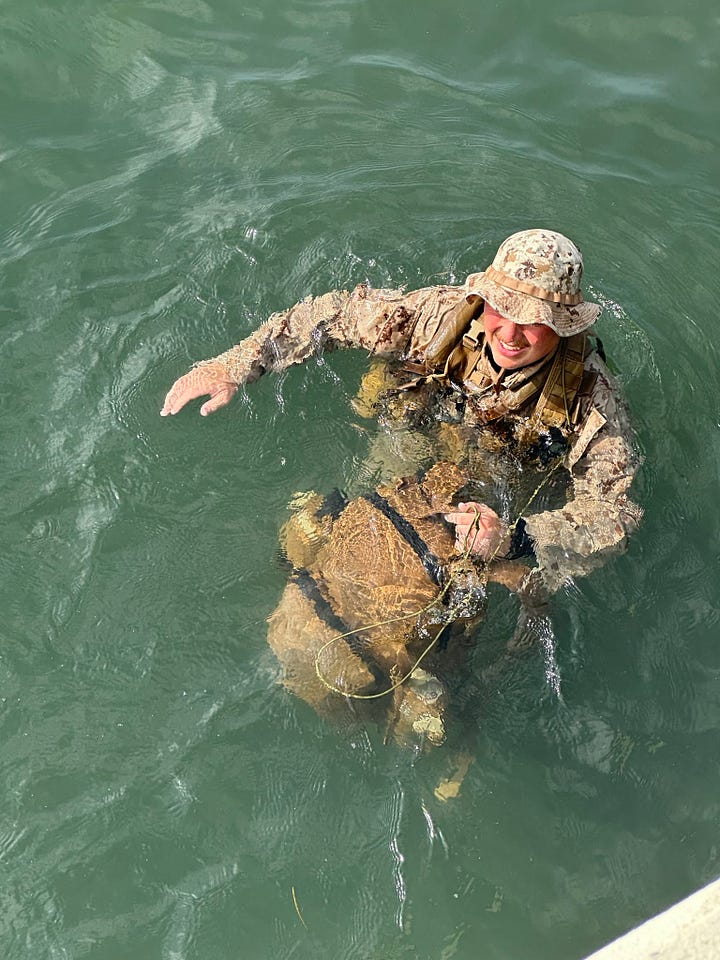
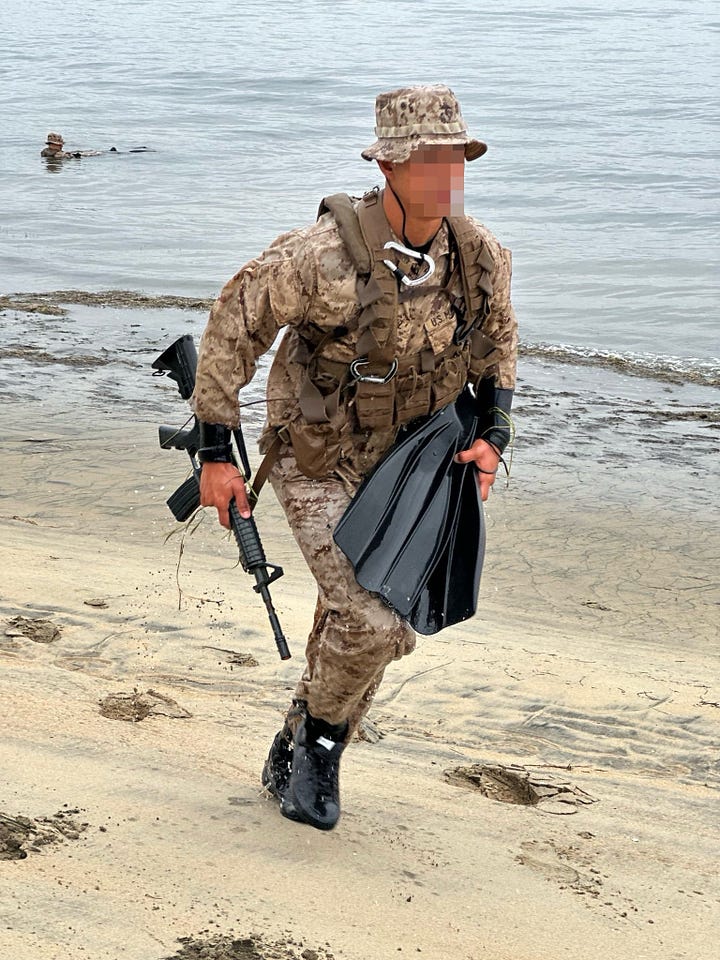
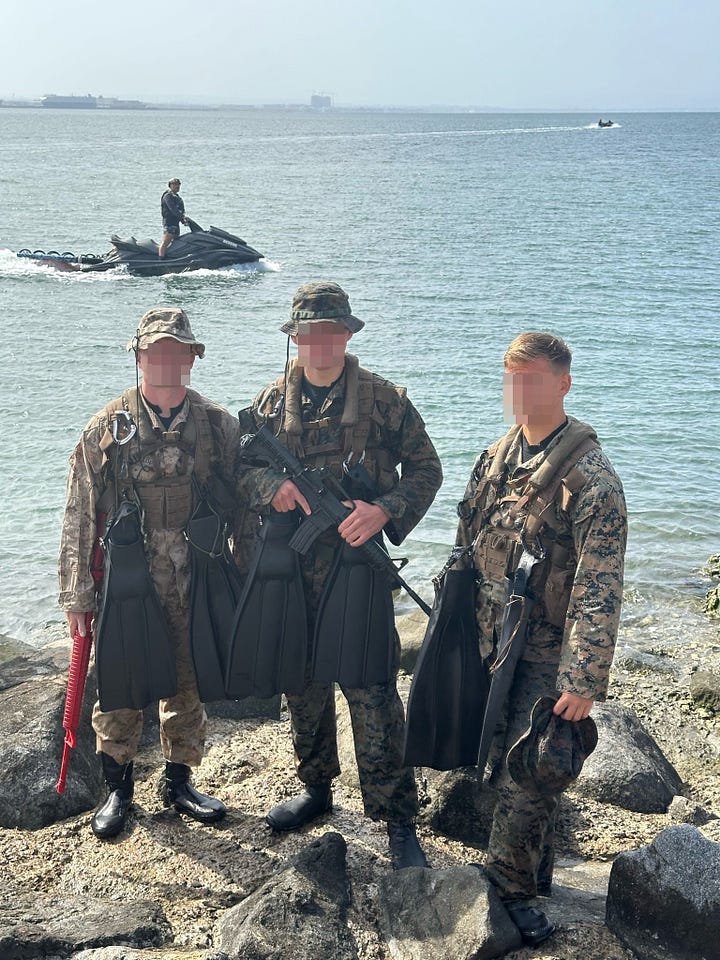
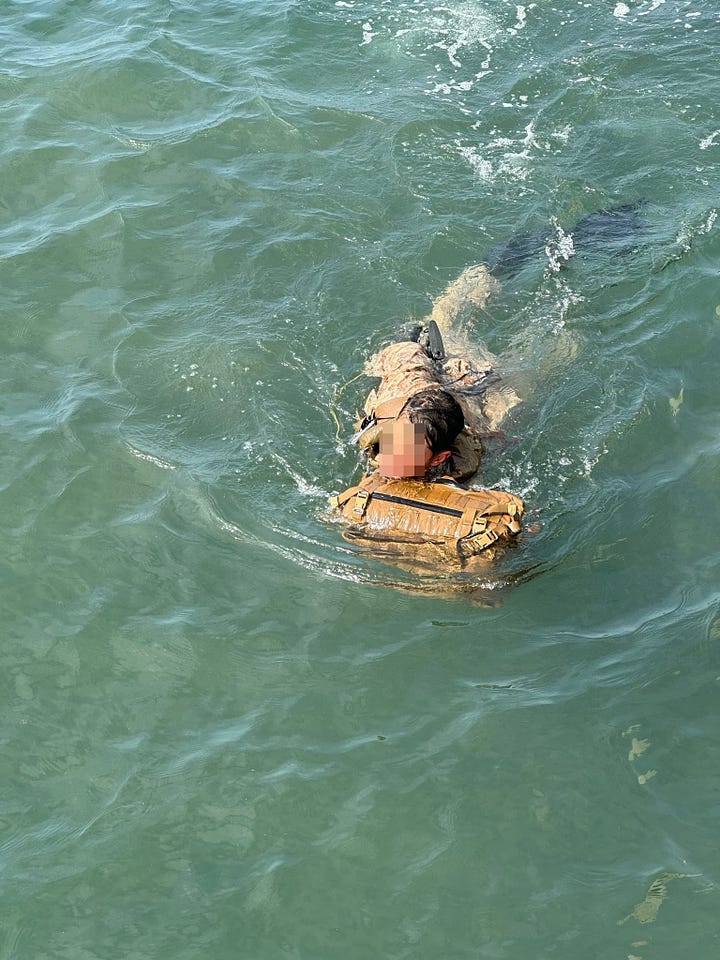
‘Buckskin Gunfighter’ is a Staff Sergeant in the US Marine Corps with 10 years in the infantry. Multiple duty stations include Security Forces Battalion Bangor WA, 2nd Battalion 1st Marines, and Infantry Marine Course at School of Infantry-West as a Combat Instructor. He currently serves in 2nd Battalion 4th Marines. Schools include Combat Marksmanship Instructor, Advanced Infantry Marine Course, Combat Instructor School, Infantry Unit Leader Course, and Scout Swimmer Course.
The Distance
J.G.P. MacAdam
Six months and a wakeup. We’re in this now. Reality’s set in, cured. Nothing to do but see it through to the end.
Trying to buck myself up I guess. Just talking (typing) to myself. I’m not supposed to keep a diary, if that’s what this is. I recall some Sergeant mentioning at some point that personal diaries were unauthorized. But I need this, need to put it down; get it out. Even if you never hear the tree falling in the forest, it’s good to know it still exists. It happened. I happened.
Do words provide proof of it? How many words do you need? How long would they have to go on to get it across?
Eternity’s a long, long way; still might not be enough…
When I’m on guard, looking out into the cold distance, I think of how all us grunts—all my battle buddies, both the ones I like and the ones I can’t stand—how we’ve all settled into this optempo grind. This mean routine. Ronner describes it best: “Fucking guard, fucking missions, fucking guard, something fucking horrible happens, more missions, more guard, something fucking stupid happens, something fucking horrible, something fucking stupid, fucking guard, fucking missions...”.
Ronner’s past the point of no-return. He doesn’t see how it’s the mean routine which keeps us going, focused, jiving to a predictable bomb-beat. The same shit over and over, and over and over, again…
Order out of chaos, right?
Still can’t believe we’re only six months into this and I already can’t wait for it to end. This is what I signed up for, trained for, waited years for, but… it isn’t what I thought it was going to be like. (What is?)
What is it?
You know it when you see it, I guess.
We’d taken Kunkler out on a stretcher. He’d fallen. Bound to happen to somebody at some point. Cliffs unclimbable. Summit half-hidden in clouds. Ground like one long slag pile; two steps up, one back, the whole goddamn way. A pointless patrol to the tippy top of some crag some hooah Major fifty klicks away staring at a map wants to establish an Observation Post on; so he can say we’ve got control of a piece of prime real estate; we’ve cleared, secured, occupied key terrain. (Order, again, I guess. Or just more chaos.) On our stairway to heaven to establish said OP, Kunkler slipped and rolled down, and down, and down. So fuckin’ far. Took us half the night to get to him. Could hear him moaning down there, in the ravine, lodged between what outcropping of rocks broke his fall. He moaned he’d broken his leg. He moaned he could see the bone. He moaned he couldn’t move. He moaned until he was making zero fucking sense whatsoever, reams of gibberish echoing hundreds of meters up and down the ravine. He moaned till he stopped moaning, and we scrambled faster, just a squad of us backtracking down, then up, rolling our ankles, skidding on our asses, tearing our ACU’s on the sharp ledges, and not only watching for the enemy to tear us a new one but for serial killer rocks tumbling off the talus slopes.
We crawled up and finally got to Kunkler. Doc said he was in shock; open fracture in the leg, spine fracture likely. Sergeant Turner called in the bird. We had to carry Kunkler on a stretcher down the cliff, down the draw. Still the bird couldn’t land; it had to lower a basket. Kunkler went up, twirling in circles the same direction as the rotors making the cedars bend, spinning so much he got nauseous and threw up. His vomit rained thirty feet down onto us, plunked on our helmets, shoulders, weapons—acid stink.
“There it is,” said Sergeant Turner.
“Charlie-mike,” said the LT, and back up the mountain in all our vom-spattered glory we went.
Major Hooah got his OP.
An OP so fucking far from anything only the 240 is worth shooting from up there, and even then, it’s plunging fire onto an area target. Just spraying, really. View’s pretty, though. Air thin, fresh; no burn pit. Can see into Pakistan. All the way to the snowcaps that never melt.
Now we’re back on base. A hot meal in my belly. Another platoon taking their spin up at the OP. I just got off guard where I stood in the tower four fucking hours staring at my sector, between the ten and two, the ten and two, the ten and two, intersecting with other ten and twos five hundred meters to my left and to my rear. Staring at a cluster of qalats at eight hundred meters, at the dead space at three hundred, at the squiggly dirt road leading out of the valley, a thousand yards, and more, into the distance. Staring at the same jagged line of hills that were there four fucking hours prior when my shift started, six months ago when our deployment started, and will be there long, long after everyone’s gone.
Though, I don’t see a hopeless horizon forever circling back in on itself like Ronner. I don’t smell so much the burning plastic trash, or the hot rot of a Talib boy two days dead under the sun, or the fresh manure in the lower level of the qalats where people keep their animals in the winter. I don’t see so much the helmet, rifle, boots, or dangling dog tag memorials multiplying in the quad trying to fill the empty spaces in the ranks like little abysses you don’t want to look into but can’t not look into; the distance between this life and the next so slim, sometimes it’s like it’s not even there at all. No, I see the light; way down the end of the road. It’s white, tiny, barely visible, but twinkling like a beacon, or a promise growing brighter with every hour. It’s the light of all this ending; for me, at least. It’s the pink light of dawn; though we spin ceaselessly, we never spin in the same place twice. Only a half-circle around the sun, a season or two’s time, not so far, really, before twelve-thousand miles around this blue marble and an airport and a welcome home whether the war’s really over or not; it’s over for us. It’s the light rendering the now into memory; like through night vision the neon halo of the moon emerging from behind the mountains. It’s a milky streetlight at the end of a cul-de-sac, a star-spangled city at night. It’s the little blue dots on the tarmac bringing that big bird down, home, at last, to a new beginning and yet another distance to cross.
J.G.P. MacAdam is a combat vet and the first in his family to earn a college degree. His publications can be found in The Colorado Review, The Atticus Review, JMWW, Pithead Chapel and Consequence, among others. You can find him at jgpmacadam.com
Poetry and Art
Poetry and art from the warfighting community.
The Lonely Company
Emma Blunt
We walked the lonely company, a platoon, a dozen, then some. We followed stars in the night, and breathed the air as one. Can you trace a drop of rain, from rivers to ocean deep? Or separate each grain of sand, in every desert sea? Could I take back my words, and silence the regret? The heaviness of man’s first cry, in laying dead to rest. I was your lonely company, Now but a droplet in the sea, a speck of dust on Sahara dunes, the silence in the breeze.
This poem draws from my experiences living in the Sahel and commemorates the life of my ancestor, Allan Begbie Campbell. Allan was born on the 29th of January 1889 in NSW and served in the Australian Army No. 908, 3rd reinforcement, 12th Regiment ALH, 4th Brigade. He sailed on the KUNIC on the 9th of August 1915 and was killed in action during the second battle of Gaza on the 19th of April 2017 at the age of 28. His name can be found at the Jerusalem War Memorial and the Australian War Memorial, but his body was never found. Allan’s Father, Alfred Campbell, published “Ode to ANZAC Day”, “Australia’s Response: a patriotic song” and submitted a proposal for Australia’s national anthem. Quite the patriot. Emma is an emerging poet, and works from home in Personnel Administration. She was born in Belgium and raised in North Africa to Mexican/Australian parents before moving to Australia in the early 2000s. Outside of work Emma enjoys traveling, writing, keeping up on geopolitics and photography. She lives in the Murray Valley in North East Victoria, Australia and has been enjoying living close to the High Country for two years. Having spent the last 15 years traveling and working around Australia, Emma plans to travel more and focus on growing her skills in freelance writing.
Glimpses Of
Evan Young Weaver
War Through layers of thick glass and walls and people and commo lines Flashes of color and of faces and of fear over the not-cold air blowing - equipment humming Boomerang, Duke, Apache, Blacksmith Call signs, nicknames, proper nomenclature? Know it when you see it Know it after you feel it Know it forever Love Through looks in eyes and from past and into future layers reveal layers and layers reveal layers in the mud of darkness, in the bright light There is hope in there, somewhere? In wonder, and in doubt, and in fear? Know it when you see it Know it after you feel it Know it forever
Book Review
Training for Victory by Frank Sobchak
Levi Leet
Whether on active duty, reserve status, a veteran, or a diligent citizen interested in American foreign policy, it is easy to embrace cynicism in the wake of the United States’ withdrawal from Afghanistan. Over two decades of blood, sweat, and tears could be seen as a frivolous waste and a disheartening omen in the face of Ukraine, Israel, Palestine, and Taiwan. What can we possibly do to avoid more lives lost, humiliation on the international stage, or degradation of the mutual trust between our armed forces, elected representatives, and the American people? There is no simple answer to these questions, but in Training for Victory, Frank Sobchak offers a concise body of work that we can use to reflect and inform ourselves on one method for facing these problems .
Sobchak’s work is a thorough and well-organized after-action of special operations advisor missions spanning four decades and five countries, integrated with context and insightful anecdotes. Training for Victory is not your standard special operations book found on flagship bookstore aisles with personal or small unit stories dedicated to the memory of our fallen or aimed at providing motivation to lead a more disciplined life. Sobchak takes an academic approach to survey the advisor missions with a central question of what factors are most important for producing capable partners.
To avoid presenting readers with an overwhelming volume of cases with an inherent array of contextual complexity, Sobchak focuses on a relatively small sample size with enough geo-political diversity to perform an effective comparative study. The criteria for selecting the forces used in the study included volunteer forces developed through U.S. assistance during an ongoing insurgency with sustained security-force assistance conducted by U.S. Army Special Forces. While each case contains its own set of peculiarities, these shared criteria allow the reader to examine (or form their own opinions on) the effectiveness of the advisory missions.
It does not take an academic, military, or political expert to recognize patterns across the book’s five cases. In particular, consistency amongst advisor pairings and relationships amongst leaders and soldiers emerge as a clear staple amongst the more effective forces examined. This may seem like an obvious ingredient to success, but Sobchak’s survey of this aspect of the advisory mission reinforces the need to prioritize consistency over egos, policies, and financial issues.
An enduring theme throughout the book is a call to continue taking serious efforts in effectively building up our partner nation forces. Problems like corruption and cultural barriers are inherent in this process, but they should be seen as manageable hurdles rather than unscalable walls. It is difficult to walk away from Training for Victory without a dose of hope that we can continue to enhance the well-being of the Republic through deliberate efforts to train, advise, and assist our allies in key operating areas around the globe.
Sobchak’s conclusion provides a cutting rationale for why we should be reading works like Training for Victory. He concludes, “the odds are that we will have to train another foreign military at some point in the near future. Such a mission will likely even be in the context of competition with a near-peer competitor and require the capacity to conduct security-force assistance on a scale that parallels the missions in Iraq or Afghanistan. When it inevitably happens, we should be ready to implement the best strategies to give security-force assistance the greatest chance of succeeding. Pretending that a problem does not exist will not make it go away.” Instead of abandoning hope in the face of our most recent failures, Training for Victory should inspire confidence in a way forward.
This ends Volume 28, Edition 1, of the Lethal Minds Journal (01NOV2024)
The window is now open for Lethal Minds’ twenty fourth volume, releasing December 1st, 2024.
All art and picture submissions are due as PDFs or JPEG files to our email by midnight on 20 November 2024.
All written submissions are due as 12 point font, double spaced, Word documents to our email by midnight on 20 November 2024.
lethalmindsjournal.submissions@gmail.com
Special thanks to the volunteers and team that made this journal possible:





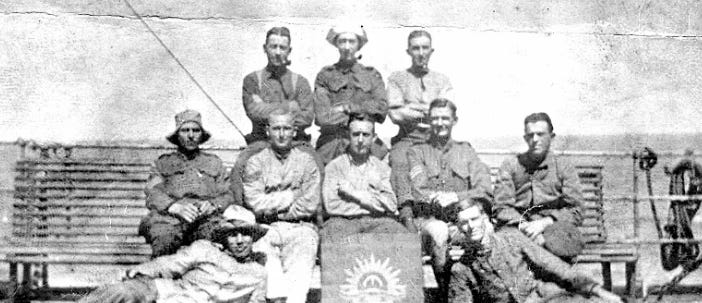
Lacking trustworthy information validates high suspicion.
Yes?
Information isn’t the problem or what is lacking, Trust is…